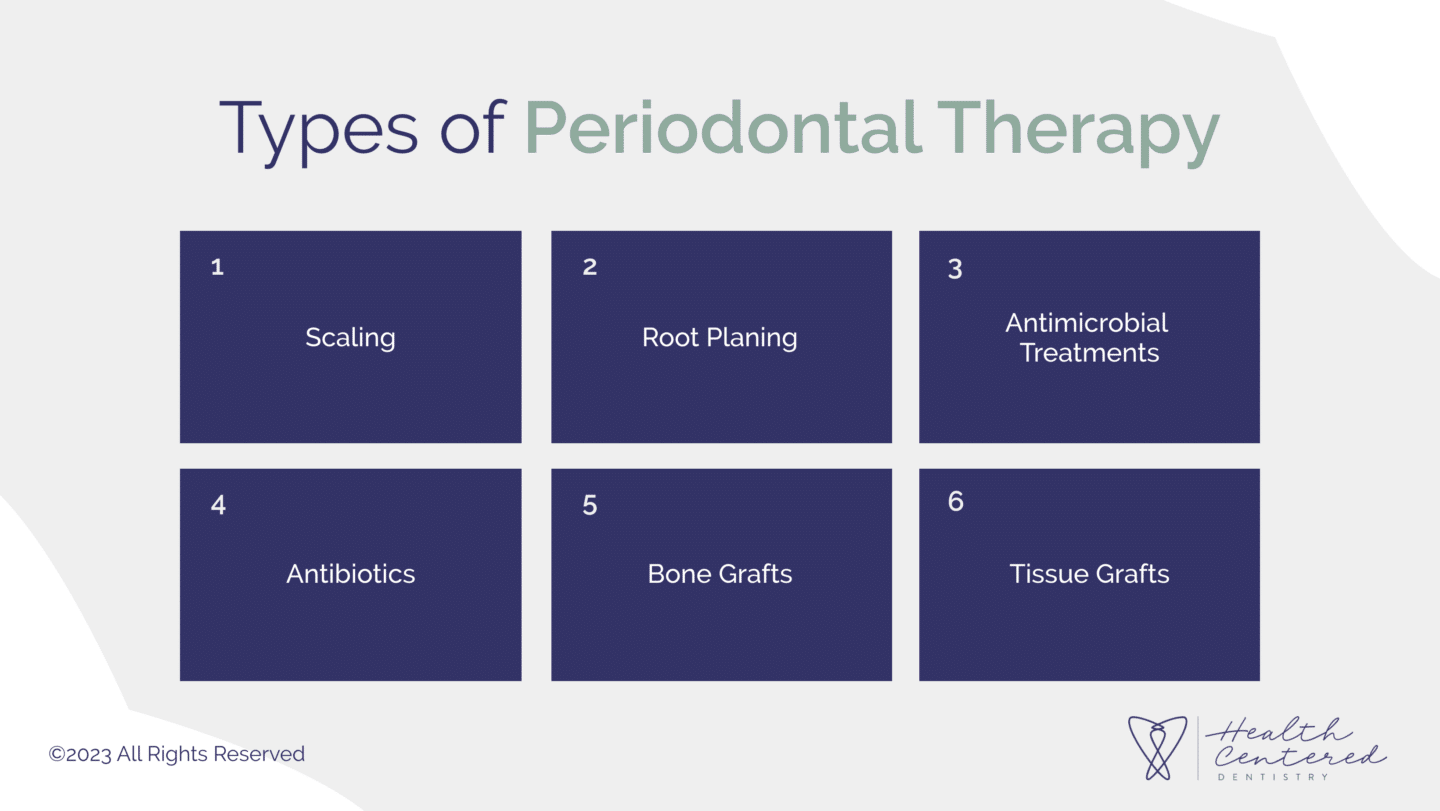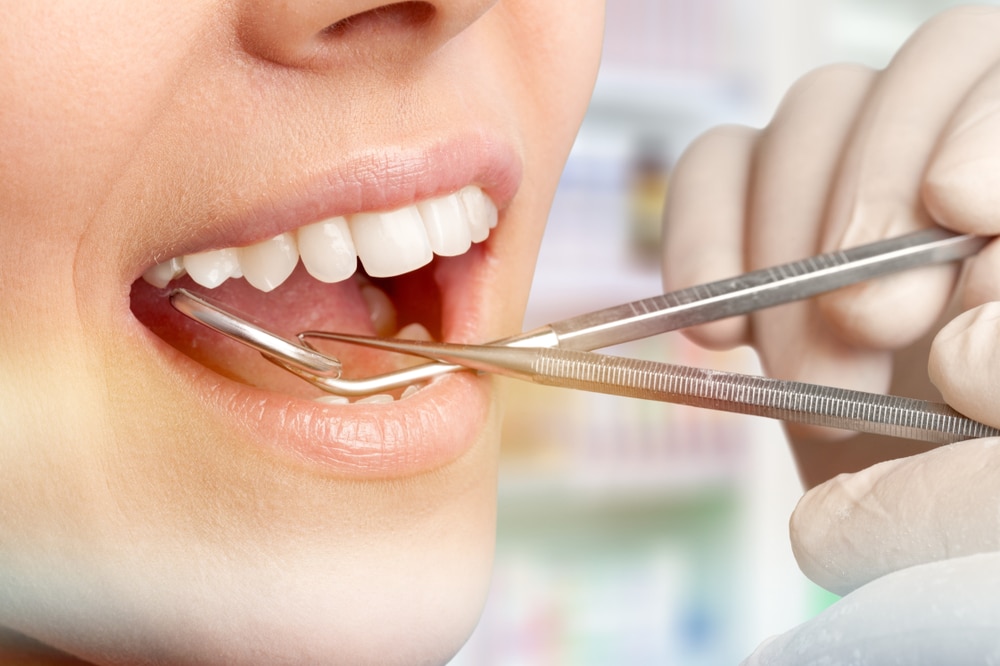Gum disease can put your teeth at risk and damage your overall health. This condition can cause tooth loss, bone loss, and gum pain. It is not an uncommon condition, either. In fact, according to the CDC, 47.2% of adults over 30 years old have some form of gum disease, and after the age of 65, 70.1% have it. Here’s how we can restore your oral health with periodontal therapy in Anchorage.
Have you noticed that your gums are red, painful, or swollen? Schedule a visit to discuss periodontal therapy in Anchorage at Health Centered Dentistry.
When to Seek Treatment for Gum Disease
Not everyone needs periodontal therapy. So, how do you know if you need this treatment?
Watch for the Signs of Gum Disease
Gum disease causes a wide range of telltale symptoms that are hard to miss. While you might be able to tell there’s an issue in the early stages of disease, as it progresses, there are many indicators that you need to get your gums and overall oral health checked. These symptoms include tooth pain or loss, gum recession, bleeding, and changes in your bite. Gum disease can even give you chronic bad breath. When you notice these signs, it’s time to set an appointment with your dentist to evaluate your possible gum disease and its severity.
Seek Help as Early as Possible!
Timing is critical. By getting periodontal therapy as soon as possible, you might be able to avoid the most severe oral health effects. And since poor oral health can cause or contribute to diseases like heart attack, stroke, Alzheimer’s, and cancer. Seeking help immediately can help you maintain good whole-body health.
Keep Regular Dental Appointments
Life gets busy. It’s too easy to skip a dental appointment and tell yourself you’ll take care of it later. However, your dentist can detect signs of gum disease that you might not have noticed. If you regularly attend your routine dental checkups, you have the best chance of catching the disease in its earliest phases.
Types of Periodontal Therapy

Periodontal treatment is a part of our restorative dental care at HCD. After assessing your gum disease’s severity, we choose from several types of periodontal therapy.
Scaling and Root Planing
Scaling and root planing are two treatments that are usually done together for a deep tooth cleaning. This periodontal therapy often requires a topical or local anesthetic.
Scaling removes plaque and calculus from your teeth both above and below the gumline. The dentist cleans all the way down to the bottom of the tooth pocket. To perform this treatment, the dentist may use hand tools, a laser, or an ultrasonic device.
Root planing comes next, and it is a procedure aimed at smoothing the tooth roots. This helps your gums reattach more firmly to each tooth and helps prevent or reverse tooth looseness.
Antimicrobial Treatment
Antimicrobial treatment is usually done after scaling and root planing. Your dentist may give you an antimicrobial mouth rinse or apply an antimicrobial gel that reduces bacteria in your mouth. It’s important to follow your dentist’s instructions for the at-home use of an antimicrobial rinse to get the maximum help from this periodontal therapy.
Antibiotic Treatment
Taking oral antibiotics can also help reduce infections contributing to gum disease. These can be in the form of a topical antibiotic for specific targeted areas or as an antibiotic pill. Some of the antibiotics used for gum disease include:
- Tetracycline
- Azithromycin
- Metronidazole
- Ciprofloxacin
- Amoxicillin
- Clindamycin
Whether your dentist prescribes a topical preparation or an oral antibiotic, taking it consistently for the prescribed time is critical to its effectiveness.
Gum Surgery
At Health Centered Dentistry, we aim to stop gum disease before it requires surgery. However, we also provide oral surgery if your condition has become too severe to get full relief from other types of periodontal therapy. The type you need depends on what damage has been caused by the disease. We offer the following types of oral surgery for gum disease.
- Bone grafts to restore your jawbone
- Tissue grafts to replace lost gum tissue
Although we do provide oral surgery for gum disease, it’s much better to catch the disease before it progresses far enough to require surgery. However, if you do need gum surgery, we provide it in the safest, most effective way possible.
The Patient’s Role in Periodontal Therapy
Your HCD dentist and dental hygienist can help you with various types of periodontal therapy in Anchorage. However, there are also several things you can do for yourself. Your role is to prevent gum disease, watch for signs of it, and do your part in the treatment and aftercare.
Preventing Gum Disease
The best thing you can do to prevent gum disease is always to take good care of your mouth and teeth. That means being meticulous about brushing your teeth at least twice and flossing between your teeth at least once per day. You also need to make routine dental checkups and cleanings a priority.
Other factors can decrease your risk of gum disease. Here are a few things you can do to improve the condition of your gums, whether you already have periodontal disease or not.
- Quit smoking
- If you have diabetes, keep it under control
- Have old fillings replaced if needed
- Use a mouth-moistening spray if you suffer from dry mouth
- Get bridges adjusted if they no longer fit properly
- Learn to reduce or manage stress
Act Quickly If You See Signs of Gum Disease
Gum disease can progress quickly if you don’t act as soon as possible. If you see any signs of periodontal disease, see your dental care team immediately.
- Persistent bad breath
- A bad taste in your mouth
- Swollen or red gums
- Bleeding gums
- Tender gums
- Pain when chewing
- Loose teeth
- Sensitive teeth
- Gums are beginning to pull away from teeth
- Changes in the way your teeth fit together
- Changes in the way your partial dentures fit
Your HCD dentist can determine the cause of your symptoms. The symptoms of gum disease can overlap with other oral health issues, and we also strive to not only minimize these symptoms but to understand the underlying causes contributing to gum disease. Whatever the cause, your dentist discovers it and creates a customized treatment plan to improve your oral health and overall well-being.
After-Care for Periodontal Therapy
After most types of periodontal therapy, you only need to be a little more careful with your mouth until the topical or local anesthetic wears off. Don’t eat until the numbness goes away. Since your teeth will be sensitive for a while after the treatment, you’ll be more comfortable if you avoid foods and beverages that can cause inflammation. For example, you might want to wait to eat foods and drinks that are very hot, cold, hard, sharp, or sticky. After 48 hours, your teeth and gums will be less sensitive so that you can return to your usual diet.
You can take OTC pain medications if you have any pain or discomfort. If your dentist has included antimicrobial rinses or antibiotics as a part of your treatment plan, follow those instructions faithfully.
HCD Offers Periodontal Therapy in Anchorage
Health Centered Dentistry offers the best periodontal therapy in Anchorage for anyone who has concerns about their gum health. Our entire dental staff is committed to providing top-quality dental services across the board, from thorough routine checkups and cleanings to effective treatments for gum disease.
Our holistic approach to dentistry takes into account what is best for your whole-body health. Because gum disease can significantly impact your overall health, we are always vigilant to its signs.
At HCD, your oral health is our number one priority. You get a higher level of care with professional dentistry, a health-conscious approach, and the right services to meet your individual needs. Our team restores and protects your gum health with cutting-edge technology and equipment and knowledge of the most recent research on gum disease.
Want to put a stop to gum disease before it causes serious damage? Contact Health Centered Dentistry for a professional evaluation.


